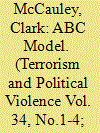|
|
|
Sort Order |
|
|
|
Items / Page
|
|
|
|
|
|
|
| Srl | Item |
| 1 |
ID:
188038


|
|
|
|
|
| Summary/Abstract |
In this commentary, I compare the ABC model of radicalization with the Two Pyramids model of radicalization. Both models distinguish radicalization of opinion from radicalization of action. Beyond this agreement are questions about the concepts deployed in advancing the ABC model and research issues relating to applications of the two models. I conclude with an optimistic assessment of recent progress in research on terrorism, including the suggestion that deradicalization of action may be forwarded by giving up on deradicalization of opinion.
|
|
|
|
|
|
|
|
|
|
|
|
|
|
|
|
| 2 |
ID:
175739


|
|
|
|
|
| Summary/Abstract |
How long does it typically take a returned foreign fighter to launch a domestic terror attack? The issue of returnees, and appropriate national and international responses to potential threats, has become a preeminent security concern of the 2010s, impacting policies on everything from refugees to whether to permit ISIS fighters to leave the theater of conflict alive. This article attempts to illuminate these contentious debates through a new data set of Lags in Attack Times of Extremist Returnees (LATER) that examines 230 jihadi returnees to Western countries. The data indicate that the majority of attempted attacks occur within one year, with a median lag time of just four months. Prison appears to play no role in lag times. Our findings indicate that security and reintegration efforts should be targeted within the critical six months after return, which diminishes the risk of attack considerably.
|
|
|
|
|
|
|
|
|
|
|
|
|
|
|
|
| 3 |
ID:
181938


|
|
|
|
|
| Summary/Abstract |
The Women, Peace and Security (WPS) agenda is anchored in ten United Nations Security Council resolutions addressing gender equality and women’s rights in peace and security governance. The codification of the WPS agenda in the adopted resolutions establishes standards of practice to be adopted by UN member states and entities to prioritise women’s role as agents in peace and security settings and respond to women’s specific security needs. This research explores the influence of UN Security Council resolution 2242, adopted by the Council in 2015, particularly the provisions related to counter-terrorism and preventing and countering violent extremism (CT and P/CVE). Drawing on analysis of policy documents and interview data from the United Kingdom, Australia, and Sweden, the article argues that resolution 2242 is driving a degree of engagement, if not alignment, between WPS and CT and P/CVE. Further, the important differences between the operationalisation of the norms embedded in the resolution in the case study countries suggest that it would be fruitful for WPS analysts to engage in further research about how norm diffusion interacts with policy development.
|
|
|
|
|
|
|
|
|
|
|
|
|
|
|
|
| 4 |
ID:
188380


|
|
|
|
|
| Summary/Abstract |
The U.K. policy of “Prevent” aims to stop people becoming involved in, or supporting, terrorism. In common with many CVE policies worldwide, Prevent has remained controversial in its conception, delivery, and impact. A formal review is now underway, so it is opportune to ask, “Whither Prevent?” This paper will examine briefly the justifications for Prevent, but the main thesis is that the juridification of Prevent is a beneficial trend in the U.K. Juridification is depicted as: the legislative production of ever more extensive and elaborate instruments; the expansion of judicial oversight; and the administrative (bureaucratic) application of soft law standards. Juridification is here invoked in order to enhance the legitimacy of the policy of Prevent through explicit improvements in its modes of operation and through offering modes of challenge where the principles of constitutionalism are contravened. If Prevent can be improved in these ways, then its application can be refined to address more effectively and efficiently the threat of terrorist attacks, especially given that the originators or observers of these threats are invited under the Prevent policy to cooperate by consent in the enterprise of counter terrorism.
|
|
|
|
|
|
|
|
|
|
|
|
|
|
|
|
| 5 |
ID:
148669


|
|
|
|
|
| Summary/Abstract |
Following the uprisings in the Arab world, the region has lurched into a period of massive change and instability. An unfortunate consequence of this change has been the rise and proliferation of militant groups such as ISIS (Islamic State in Iraq and al-Sham) and Jubhat al-Nusra in Iraq and Syria. These militant groups successfully recruit members from the region and beyond, fueling conflict in countries that have witnessed unrest, such as Libya, Tunisia, Egypt, Yemen, Iraq, and Syria. Although Jordan has long been seen as a regional hub of stability and security, especially by its Western allies, it increasingly exhibits symptoms of the long-standing pressures exerted upon it by the surrounding conflicts, resulting refugee crises, and pre-existing domestic challenges. Jordan’s hypothetical fall into instability could have catastrophic consequences for the region, exacerbating the crises in Syria and Iraq, empowering ISIS and other militant groups, and threatening regional and global security. In response, this article offers a general framework for the expansion of the country’s nascent Counter Violent Extremism (CVE) program, including both preventative and remedial measures. Beginning with an overview of the processes of radicalization and de-radicalization, this article proceeds with a brief discussion of Jordan’s current situation before synthesizing scholarly articles and analyses of other CVE programs in order to establish a framework to guide Jordan’s developing CVE interventions.
|
|
|
|
|
|
|
|
|
|
|
|
|
|
|
|
| 6 |
ID:
138402


|
|
|
|
|
| Summary/Abstract |
On March 28, 2015, Nigerians returned to the polls to elect a president for the fourth time since the 1999 democratic transition. Nigeria’s Fourth Republic (1999-present) has lasted far longer than any previous attempt at civilian rule in this country of more than 175 million, encompassing an era of both remarkable growth (following a 2014 recalculation of GDP with more inclusive data, it officially surpassed South Africa as the continent’s largest economy) and worrisome social conflict. Indeed, it is possible to see Nigeria as both a rapidly modernizing success story and a deeply troubled state in which more than 35,000 citizens have died in politically motivated violence over the past four years. While its foreign direct investment inflows ($5.6 billion in 2013) put it in the company of advanced nations like France and Japan, it joins Syria, Iraq, Pakistan, and Afghanistan in a group of five countries that accounts for 80 percent of the world’s deaths from terrorism.
|
|
|
|
|
|
|
|
|
|
|
|
|
|
|
|
| 7 |
ID:
149555


|
|
|
|
|
| Summary/Abstract |
Manal Omar, author and a vice president at the U.S. Institute for Peace, argues that to successfully counter violent extremism (CVE), practitioners need to address concerns that these strategies are designed only to serve Western interests. Thus, CVE programming should commit to an inclusive agenda, acknowledge an array of factors that drive individuals toward extremism, highlight the positive role faith can play in preventing violence, and establish partnerships with women and youths.
|
|
|
|
|
|
|
|
|
|
|
|
|
|
|
|
|
|
|
|
|